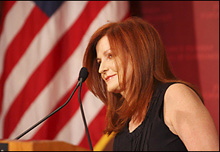
October 25, 2007 — Maureen Dowd, who won the Pulitzer Prize in 1999 for a series of columns on the Monica Lewinsky affair, was at the John F. Kennedy Jr. Forum tonight to deliver the 2007 Theodore H. White Lecture on Press and Politics. It’s co-sponsored by the Institute of Politics and the Kennedy School’s Shorenstein Center on the Press, Politics and Public Policy.
- Watch the Video
- Read the Transcript
Before Dowd took the stage, Washington Post reporter Dana Priest accepted the center’s third annual David Nyhan Prize for Political Journalism. Priest broke the story of secret overseas CIA prisons in 2005, and in 2006, she both won the Pulitzer Prize for beat reporting, and broke stories on the inadequacy of medical care for Iraq War veterans at Walter Reed Army Medical Center.
“Each year, this night is one of the great ones,” said Shorenstein Center director Alex S. Jones of the double bill, an annual award and speech. He was a reporter at the New York Times with Dowd, and said she is “feared for her wicked tongue and biting prose.”
At the forum, Dowd kept her humor visible, and her delivery rapid and self-deprecating. “I’m afraid I’m going to be the Marie Osmond of Harvard — and faint,” she began, confessing “great dread” at the idea of public speaking.
Dowd had the solace that her one-liners could also be “hearsay.” She related humorous wisdom from R.W. Apple, Russell Baker, one-time New York Times editorial page editor Howell Raines, William Safire, and the late Arthur M. Schlesinger Jr., whose posthumous “Journals: 1952–2000” Dowd recently reviewed for the New York Times Book Review.
Today, journalism’s famously raffish reporters of legend seem to have been replaced by what Dowd called “the dweebs on the bus” — writers so deeply into their BlackBerries and other gizmos that they sometimes miss the story.
To Dowd, the story of politics has always been the story of its near-Shakespearean cast of characters — the strange, the grasping, the lazy, the luminous, and the egotistical. She imagined a world with the laid-back Fred Thompson as president, for instance. He might have stuck a Post-it note on the refrigerator — “Saddam?” — then forgotten about it for years.
In casting her ongoing Beltway stage play, Dick Cheney and Donald Rumsfeld were the “two grumpy old men” of the Bush White House, said Dowd, driven to war by “a ‘shock and awe’ masculinity.” The president himself — once described by Dowd as the “Boy Emperor” — is still the “the malleable and incurious W” he was eight years ago, she said.
In a speech devoted to the Fourth Estate, Dowd turned some of that skepticism to the state of the media itself. “It’s a tough time for journalism,” she said — an age of technological transition, falling budgets, and shaky judgment. (One California media outlet, Dowd related, outsourced its local news coverage to India.)
“Still, call me a dreamer,” she went on, “but I don’t worry too much about journalism’s future.” Why? “I have great faith in the story,” said Dowd, whether it comes from a blog or rolls off an old Royal typewriter. “The important thing is the narrative.”
At its best, that narrative challenges political leaders to tell the truth and do the right thing — most important in a post-9/11 world, when at first the skepticism of American journalists briefly weakened, she suggested. “We can keep pressing and keep pressing,” she said.
Comedians working in the tradition of English satirist Jonathan Swift have a legitimate place in journalism too, said Dowd, describing an improbable visit to the New York Times newsroom by television satirist Stephen Colbert.
News and comedy are just right for a new generation unsure about the details of political skirmishes, said Dowd. “It’s analogous to Harry Potter getting kids to read.”
In addition to Dowd’s talk, the evening was also devoted to awarding the third David Nyhan Prize for Political Journalism, which was awarded to Pulitzer Prize–winning journalist Dana Priest of the Washington Post.
This article is based on one written by Corydon Ireland of the Harvard News Office; the photo is by Kris Snibbe.

